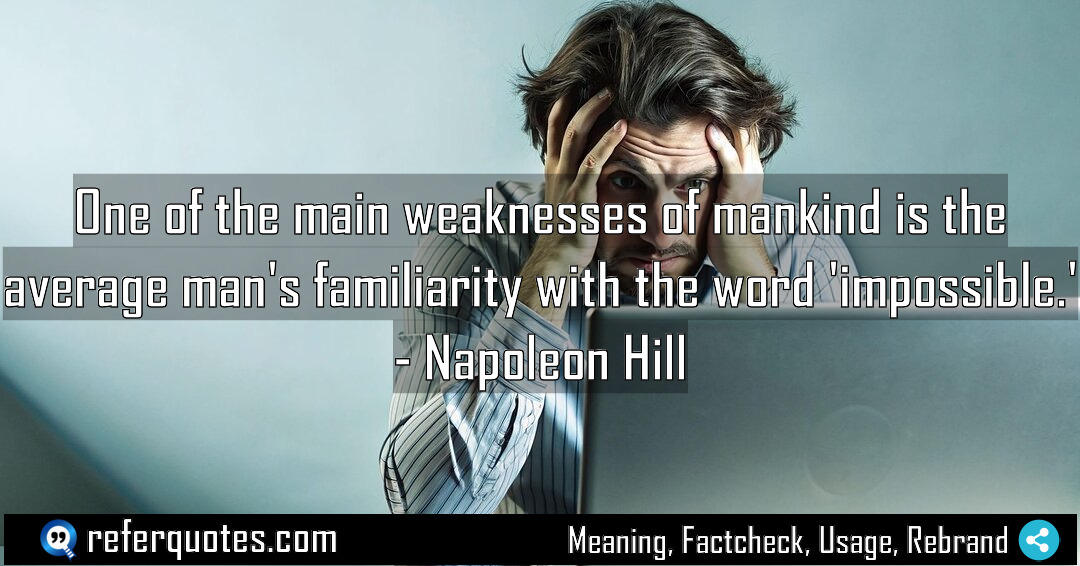One of the main weaknesses of mankind is how we’ve normalized the word ‘impossible.’ It’s a mental cage we build for ourselves, and honestly, it’s the single biggest thing holding most people back from achieving what they’re truly capable of. Once you understand this, you can start to dismantle it.
Share Image Quote:Table of Contents
Meaning
The core message is that we’re culturally programmed to accept limits. The real weakness isn’t the challenge itself; it’s our collective, casual acceptance that certain things can’t be done.
Explanation
Let me break this down. Hill isn’t talking about literal impossibilities, like jumping to the moon. He’s talking about our psychological relationship with the word. When we say something is “impossible,” what we’re really saying is “I don’t currently see a solution,” or “No one I know has done it before.” It’s a thought-terminating cliché. It shuts down creativity, ambition, and that relentless drive to figure things out. And the scary part? It’s contagious. We hear it from our peers, our families, the media… and we start to believe it without even questioning it. That’s the familiarity he’s warning us about.
Quote Summary
| Context | Attributes |
|---|---|
| Original Language | English (3668) |
| Category | Personal Development (697) |
| Topics | belief (103), fear (92), possibility (8) |
| Literary Style | assertive (142), provocative (37) |
| Overall Quote Score | 80 (256) |
Origin & Factcheck
This quote comes straight from Napoleon Hill’s 1937 classic, Think and Grow Rich, published in the United States. It’s a cornerstone of his philosophy. You’ll sometimes see similar sentiments misattributed to figures like Henry Ford, but this specific phrasing and its foundational role belong to Hill and his study of ultra-successful individuals like Andrew Carnegie.
Attribution Summary
| Context | Attributes |
|---|---|
| Author | Napoleon Hill (84) |
| Source Type | Book (4032) |
| Source/Book Name | Think and Grow Rich (37) |
| Origin Timeperiod | Modern (530) |
| Original Language | English (3668) |
| Authenticity | Verified (4032) |
Author Bio
Napoleon Hill (1883–1970) wrote influential books on achievement and personal philosophy. After interviewing industrialist Andrew Carnegie, he spent years studying the habits of top performers, which led to The Law of Success and the classic Think and Grow Rich. Hill taught and lectured widely, promoting ideas like the Master Mind, definite purpose, and persistence. He collaborated with W. Clement Stone and helped launch the Napoleon Hill Foundation to preserve and extend his teachings. His work continues to shape self-help, entrepreneurship, and success literature.
| Official Website | Facebook | X| Instagram | YouTube
Where is this quotation located?
| Quotation | One of the main weaknesses of mankind is the average man's familiarity with the word 'impossible.' |
| Book Details | Publication Year: 1937; ISBN: 978-1-59330-200-9; Latest Edition: 2020; Number of Pages: 320 |
| Where is it? | Chapter 14: The Sixth Sense, Approximate page from 2020 edition: 276 |
